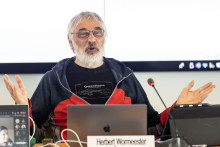'Actually, Herbert's party has one name too many on the list', says Jacqueline Weppelman - of the one-person party List Weppelman - with a broad smile. 'Then there would have been no need for staff elections.' Wormeester's party Campus Coalition has nine candidates on the list. 'We actively sought them out, but did not go all the way,' he says. 'Work pressure is an issue. There were people who said: great fun, but knock on our door again in two years' time. In addition, we wanted to avoid robbing faculty councils of their resources and thus encumbering the decentral participation with problems.'
Is there a choice?
With these ten candidates for nine seats, is there anything to choose for staff members next week? 'You can say it's disappointing. But there is indeed something to choose,' says Wormeester. 'Actually, there was even more to choose from in the last period, when people could have stood for election. But apparently there were not more candidates. Fortunately, what we do see in our own circles is that the people who declined a place on the electoral list are willing to actively work with our party. So we have a pool of active people around our group, whom we can regularly ask for input. That is also extremely important.'
Weppelman, who has been a member of the University Council again since the end of 2020, thinks that work pressure plays a major role in the lack of enthusiasm. 'You might enjoy being a council member, but you are busy with the council one to one and a half working days a week. Fortunately, I can combine it with my job, but I understand that it can be extremely difficult, especially for academic staff.' Wormeester recognises that perception. 'There is a lot involved in being a council member. You have to read up - sometimes in very tedious documents. Take annual reports on the use of laboratory animals or ionising radiation, for example. They are on the agenda every year, but you do have the responsibility to read up, interpret the documents and identify the snags and catches.'
Signalling function
At the same time, it is not just tedious meeting material, Wormeester knows. 'It starts with transparency; our legitimacy largely lies in ensuring that the resources made available to the university are well spent. In addition, we have an important signalling and agenda-setting function. For example, to urge the Executive Board to hurry when it comes to the financial situation of students from conflict areas - and I don't just mean Ukraine. Or the problems employees had with AFAS software. These are issues that we raised with the Executive Board and something was done about it.'
Diversity in representation
One large party and a one-person party standing for election, while the past two years have also been difficult at election time - partly due to the corona crisis. What does that say about the state of the participation body? According to Wormeester and Weppelman, it is anything but questionable. 'It is not about the number of parties or candidates,' says Weppelman. 'I think the current composition of the Dutch parliament is a good example that more is not always better. The most important thing is that you have diversity in representation. That is much more important than the number of parties.' Wormeester agrees. 'The most important thing is pluriformity, to let voices be heard from various corners of the UT community. We took this into account when compiling our list of candidates.'
PvdA and GroenLinks
What do both parties want to offer? 'Because we have such a broad range of candidates and are a large group, we can get stuck into all kinds of issues: research, education, finance, human resources management, strategy... That is the big difference between Campus Coalition and List Weppelman; I suspect that Jacqueline will face a greater challenge in choosing which issues to focus on.'
'With my background, I have a lot to bring to the table in the areas of finance, operations and personnel arrangements,' says Weppelman. 'For example, I already focused on the whistleblowers' code. The draft document threatened to be anything but people first, while it is actually important that abuses can be reported in time.' That's why she thinks it's a shame that the Party of the UT - and in particular council veteran Dick Meijer (due to his upcoming retirement) - has dropped out of university politics. 'He is an expert in many ways and areas and, above all, he stands up for the rights of employees. I would like to continue that sense of justice.'
Apart from the differences between them, both list leaders mainly point out the similarities and the joint responsibilities of the employee participation body. 'It's not about party political points or programmes, but about the accents you set', says Wormeester. I dare say we are 99 percent on the same page', adds Weppelman. 'It is only that I am standing for election as a one-person party, I might just as well have been part of Campus Coalition.' With a wink: 'We are a bit like the PvdA and GroenLinks.'






